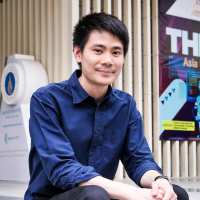The DSI hosts a number of PhD students, funded from a variety of mechanisms including industry, research funders and self-funded.
All applications for a PhD programme need to be submitted through the department where the chosen supervisor sits. For example, if the supervisor is hosted in the Department of Computing, visit this page with relevant information about the application process.
The DSI are currently advertising for a PhD studentship in collaboration with the China State Shipbuilding Corporation (CSSC) and Jiangsu Automation Research Institute (JARI) to produce the next generation of Data Scientists, if you are interested you can find further information on our vacancy page. The closing date for applicants is 28th February 2021.
Imperial College London received funding from UKRI for a Centre for Doctoral Training in AI for Healthcare which is currently open for applications. More information on the CDT can be found here.
PhD Alumni
Axel Oehmichen
Axel was a PhD student at the Data Science Institute (DSI) from 2014 to 2018.
What is he doing now: He co-founded a start-up called Secretarium (https://secretarium.com/) and assumes the role of Chief Data Science Officer. He is applying his knowledge in distributed computing and privacy to build a confidential computing platform to simplify the setup and integration of privacy-respecting applications in finance and life science. 
"This dual position as a researcher and a student has proven extremely rich in experiences as I was learning and collaborating with other DSI researchers across different fields."
"This dual position as a researcher and a student has proven an extremely enriching experiences as I was learning and collaborating with other DSI researchers across different fields."
Dr Axel Oehmichen
Axel on his time at the DSI; "I was a part-time PhD student and a research associate working on the eTRIKS and OPAL projects. My research focused on the development of a new platform called the eTRIKS Analytical Environment (eAE) as an answer to the needs of analysing and exploring massive amounts of medical data in a privacy preserving fashion. This dual position as a researcher and a student has proven an extremely enriching experiences as I was learning and collaborating with other DSI researchers across different fields. Those collaborations have brought me new perspectives, allowed me to explore new fields and helped me grow as a researcher. I am an engineer by training and, while it was sometimes challenging, that duality made it possible to join both worlds during my PhD and facilitated my transition to the start-up world".
Hao Dong
 Supervised by: Yike Guo
Supervised by: Yike Guo
What is he doing now: Hao Dong is an assistant professor at Peking University studying AI, robotics and vision. He has a broad interest in the generalisation problem using generative models and self-supervised learning. He lead several open source communities, e.g., TensorLayer and OpenMLsys, and won the Best Open Source Software Award at ACM Multimedia 2017. He also founded a startup for brain-computer interface with Yike Guo between 2012 and 2014.
Akara Supratak
Akara Supratak was a PhD student at the Data Science Institute (DSI) from 2013 to 2017, supervised by Professor Yike Guo. During his PhD, he has developed a deep learning model, named DeepSleepNet, for automatic sleep stage scoring, which can achieve state-of-the-art performance (https://github.com/akaraspt/deepsleepnet). The study at DSI has given him an opportunity to learn and work with other researchers across different fields such as distributed computing and health informatics, and has broadened his knowledge and experience in doing frontier research.

What is he doing now: He is an instructor at the Faculty of Information and Communication Technology (ICT), Mahidol University, Thailand. Currently, he teaches several courses for undergraduate students such as Fundamentals of Programming and Computer Architecture. His research focuses on Machine Learning, Biosignal Processing, and Image Processing.